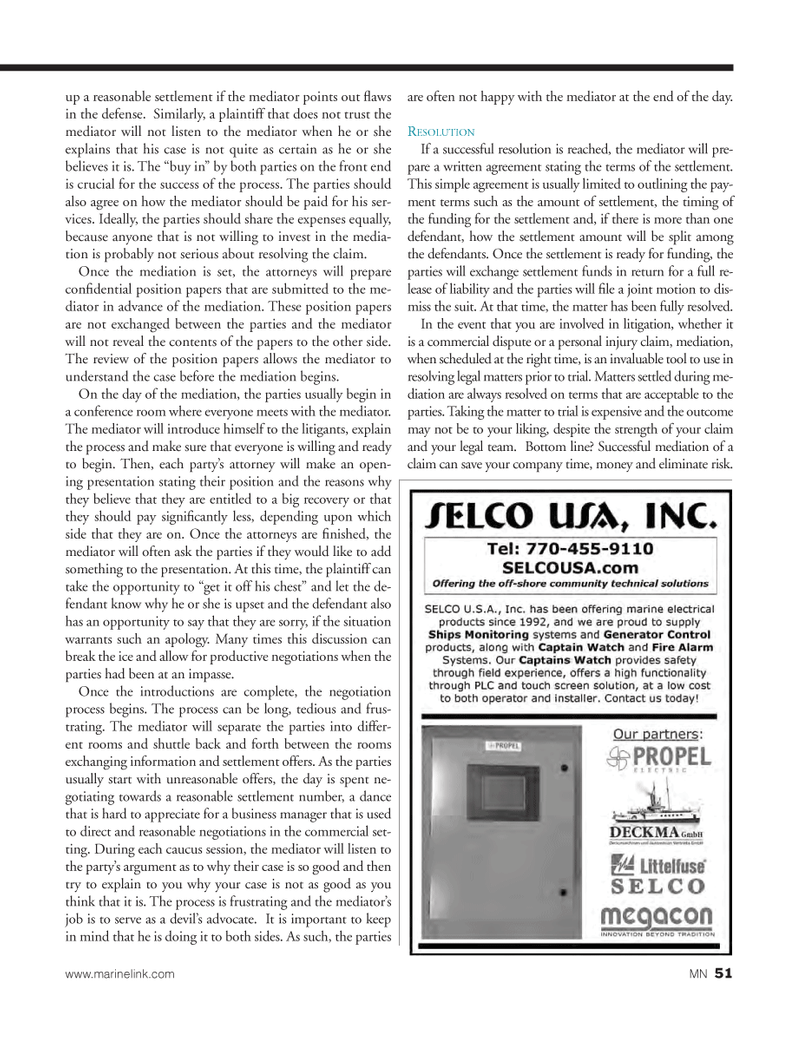
Page 51: of Marine News Magazine (April 2013)
Offshore Service Operators
Read this page in Pdf, Flash or Html5 edition of April 2013 Marine News Magazine
up a reasonable settlement if the mediator points out ß aws in the defense. Similarly, a plaintiff that does not trust the mediator will not listen to the mediator when he or she explains that his case is not quite as certain as he or she believes it is. The Òbuy inÓ by both parties on the front end is crucial for the success of the process. The parties should also agree on how the mediator should be paid for his ser- vices. Ideally, the parties should share the expenses equally, because anyone that is not willing to invest in the media- tion is probably not serious about resolving the claim. Once the mediation is set, the attorneys will prepare conÞ dential position papers that are submitted to the me- diator in advance of the mediation. These position papers are not exchanged between the parties and the mediator will not reveal the contents of the papers to the other side. The review of the position papers allows the mediator to understand the case before the mediation begins. On the day of the mediation, the parties usually begin in a conference room where everyone meets with the mediator. The mediator will introduce himself to the litigants, explain the process and make sure that everyone is willing and ready to begin. Then, each partyÕs attorney will make an open- ing presentation stating their position and the reasons why they believe that they are entitled to a big recovery or that they should pay signiÞ cantly less, depending upon which side that they are on. Once the attorneys are Þ nished, the mediator will often ask the parties if they would like to add something to the presentation. At this time, the plaintiff can take the opportunity to Òget it off his chestÓ and let the de- fendant know why he or she is upset and the defendant also has an opportunity to say that they are sorry, if the situation warrants such an apology. Many times this discussion can break the ice and allow for productive negotiations when the parties had been at an impasse. Once the introductions are complete, the negotiation process begins. The process can be long, tedious and frus- trating. The mediator will separate the parties into differ- ent rooms and shuttle back and forth between the rooms exchanging information and settlement offers. As the parties usually start with unreasonable offers, the day is spent ne- gotiating towards a reasonable settlement number, a dance that is hard to appreciate for a business manager that is used to direct and reasonable negotiations in the commercial set- ting. During each caucus session, the mediator will listen to the partyÕs argument as to why their case is so good and then try to explain to you why your case is not as good as you think that it is. The process is frustrating and the mediatorÕs job is to serve as a devilÕs advocate. It is important to keep in mind that he is doing it to both sides. As such, the parties are often not happy with the mediator at the end of the day. RESOLUTION If a successful resolution is reached, the mediator will pre- pare a written agreement stating the terms of the settlement. This simple agreement is usually limited to outlining the pay- ment terms such as the amount of settlement, the timing of the funding for the settlement and, if there is more than one defendant, how the settlement amount will be split among the defendants. Once the settlement is ready for funding, the parties will exchange settlement funds in return for a full re- lease of liability and the parties will Þ le a joint motion to dis- miss the suit. At that time, the matter has been fully resolved. In the event that you are involved in litigation, whether it is a commercial dispute or a personal injury claim, mediation, when scheduled at the right time, is an invaluable tool to use in resolving legal matters prior to trial. Matters settled during me- diation are always resolved on terms that are acceptable to the parties. Taking the matter to trial is expensive and the outcome may not be to your liking, despite the strength of your claim and your legal team. Bottom line? Successful mediation of a claim can save your company time, money and eliminate risk. www.marinelink.com MN 51MN April2013 Layout 50-58.indd 51MN April2013 Layout 50-58.indd 514/2/2013 9:57:30 AM4/2/2013 9:57:30 AM

 50
50

 52
52
